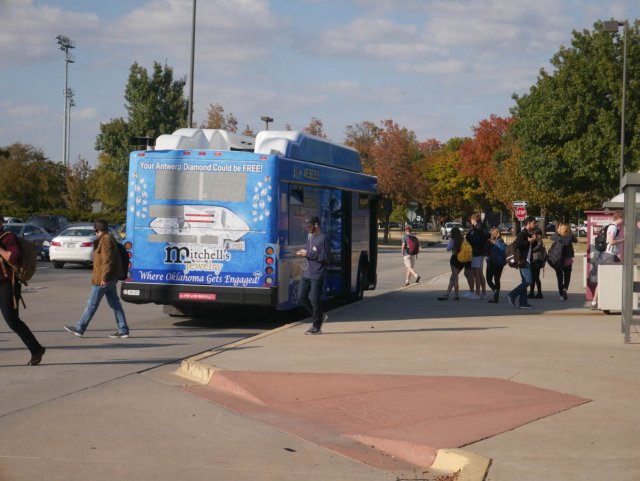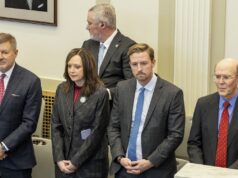

Norman residents will have the opportunity to vote Tuesday, Nov. 12, on a one-eighth percent sales tax that would be directed to the city’s public transportation system.
If approved, the proposal is expected to generate revenue to help fill a $2.2 million funding deficit without raising current sales tax levels. The money generated will go directly into a fund only to be used for public transportation, a service area that suddenly needed support after University of Oklahoma belt tightening left a financial hole.
Norman Councilman Stephen Tyler Holman (Ward-7) said this sales tax is proposed as one of two extensions for a one-fourth percent sales tax expiring in April 2020.
Holman said while Norman is working with Moore, Oklahoma City and Del City on a regional transit system, it makes sense to contract with Embark, the same contractor providing transit in OKC.
Once Embark gained the information needed, Holman said they came back with the funding amount for what they needed.
“That’s when we started looking at ways of how to get that, and thankfully the sales tax that came about is set to expire,” Holman said. “It was approved about 10 years ago to build a jail in Cleveland County.”
Joining the Norman transportation funding proposal on the Nov. 12 ballot will be a vote for Cleveland County residents to renew the other one-eighth percent of the expiring sales tax for county purposes, Holman said.
Holman said cities in the county were looking for ways to extend the remaining one-eighth percent sales tax. He said Moore is renewing a one-eighth cent sales tax for water purposes, and Norman will pursue one-eighth for public transit.
Holman said specifically the one-eighth percent comes out to $0.125 for every $100 someone in Norman spends. And because it is a renewal of an existing tax, the only thing that will change is where the money goes.
“If [residents] vote yes, taxes will stay the exact same as they are right now,” Holman said. “If [residents] vote no, taxes will go down by one-eighth of a percent, and we will potentially lose the public transit system the people rely on.”
Holman noted that there is a “sunset clause” in the ballot language. This means the local tax awaiting approval will expire upon the approval of a metropolitan regional transit funding mechanism.
“If metropolitan voters vote to fund a regional transit solution, then Norman’s specific tax would go away,” Holman said. “And if regional transit never happens, then we would continue operating our own here in Norman.”
Burden of OU’s cuts
In July, the city took charge of the campus-only bus system from the University of Oklahoma, formerly known as CART. But taking over the bus system is costing the city more than expected.
Norman Councilman Stephen Holman said OU’s CART system was apart of major budget cuts by former OU President James Gallogly in August of last year. Holman said the university sent the city a letter last year stating they were going to cut back services by eliminating Saturday services and extending wait times from 30 minutes to an hour.
Holman said the letter explained that, by June 30 of this year, OU did not want to be involved in operating the CART system and would help with the transition of the system to the city.
“It is just unheard of — apparently — that a long-time existence transit system changes operators suddenly,” Holman said. “It is a very difficult thing for our city staff to navigate.”
“That’s what started this,” Holman said. “It’s pretty complicated because the public transit system (…) is partially funded by federal dollars, and changing who operates the system, changing routes, doing anything like that takes pretty extensive requirements.”
Holman said Norman public works directory Shawn O’Leary had to take over the responsibility of fulfilling the goal of the system.
O’Leary said the university gave the city about 11 months to make the arrangements to take over the system.
“We spent the better part of [2018] working with the university, the Federal Transit Authority, Oklahoma Department of Transportation, all of the agencies involved in public transportation to figure that out,” O’Leary said.
The cost to maintain the bus system, not including the campus-only route, is about $5.3 million per year.
Norman’s main sources of funding for the bus system in the 2019-2020 fiscal year include an annual $2 million grant from the FTA and a $1.1 million budgeted contribution from the city’s general fund, leaving a $2.2 million annual gap.
“[The FTA grant] was obviously critical to the process,” O’Leary said. “We have to have that funding in order to continue the same service the university was providing.”
However, if the sales tax is approved, it will generate about $2.5 million annually into a special fund. By law, the city is to only use money for Norman’s public transportation system.
O’Leary said over a course of three months, there were many negotiations with OU pertaining to inheriting the buses, the transfer stations and bus stops.
By the time June of this year came, Norman was still not ready to fully take over the CART system. But by Oct. 1, OU was completely out of the picture, O’Leary said.
The revenue will cover the cost of operations and maintenance with an estimated $300,000 left over for reinvestment.
“A lot of the people who ride the city bus in Norman are students going to OU that don’t live on campus.” Holman said. “But there are a lot of city residents who are elderly and disabled lower-income folks.”
According to normanok.gov, 300,861 rides were given in the past fiscal year on fixed-route buses and 32,412 paratransit rides were given to residents with limited mobility or another disability that makes it difficult to reach a fixed-route bus stop.
“We have to figure out how we can make sure that this system continues running seamlessly for those that rely on it,” Holman said.
The Norman Transcript released a letter to the editor Monday morning from Norman resident Ed Crocker, stating his urge on why voters should vote “no” for the transit tax.
“It is not a sound policy to impose a regressive sales tax increase that falls most heavily on those who must rely on public transit in the first place,” Crocker said in the letter.
Crocker said in the letter that the proposed one-eighth tax rate is brand new and not a continuing one.
“I would urge my fellow voters to take these reasons into consideration and vote to turn down this particular sales tax increase,” Crocker said in the letter.
(Update: This story was updated at 9:10 a.m. Monday, Nov. 5, to include The Norman Transcript’s letter to the editor from a Norman resident.)




















